
by Steve | Jun 8, 2020 | In the News, Perspective E-Newsletter
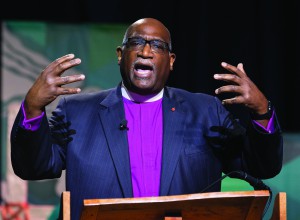
Bishop Gregory V. Palmer delivers the episcopal address during the 2016 United Methodist General Conference in Portland, Oregon. Photo by Mike DuBose, UMNS.
“What a season we have been through and what a week we are in,” wrote Bishop Gregory V. Palmer of the West Ohio Annual Conference. “The angst and pain are palpable. I need you to know I share that pain and I see me in some way shape or form every time I see video clips from Minneapolis and around the country. I have no illusion. It could have been me. That’s the world in which we live.
“The death of George Floyd is a painful sequel to much that we have seen before,” Palmer continued. “God help us if you please. I grieve for the Floyd family and all the families that have had the same or similar experience. God heal their hearts. I shudder as I watch the burning in Minneapolis, but I do watch and choose not to look away. Looking away perpetuates avoidance. I look not to condone but to be drawn deeper into the compassionate heart of Jesus our savior. Lord give us eyes to see.” (His entire message is found HERE.)
Within our society and around the world, the horrific deaths of George Floyd, Breonna Taylor, and Ahmaud Arbery have sparked passionate protest, intense soul-searching, and purposeful prayer. At this time, Christians are looking for ways to be a faithful witness to the Gospel of our Lord Jesus and his kingdom of compassion, righteousness, and justice.
Our national, state, and local leaders are in need of great wisdom at this time. This also goes for the leaders of The United Methodist Church. Local pastors are in need of prayer, as are our bishops. Here are statements from four bishops that may help you think, pray, and respond with greater spiritual insight.
* Bishop Sharma Lewis, Virginia
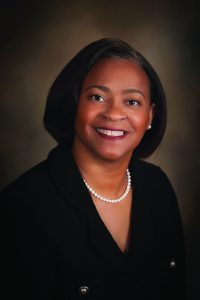
Bishop Sharma Lewis
“When do we as children of God decide that God is calling us into action? When do we decide that mere words or social media interactions for a few days are just not enough?
“When do we as children of God decide that the systemic racism in our society, whether manifested overtly or covertly, is a sin that hinders our relationship with Jesus Christ and is antithetical to the gospel?”
https://vaumc.org/bishop-lewis-calls-for-action-against-systemic-racism/
* Bishop Bruce R. Ough, Dakotas-Minnesota
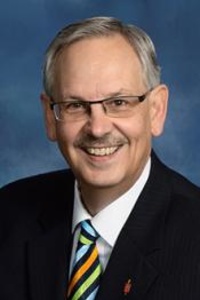
Bishop Bruce R. Ough
“Now, it is our responsibility as persons of faith, and particularly as followers of Jesus in the Methodist tradition, to address this pervasive pandemic of racism. We are compelled to address this pandemic with the same intensity and intentionality with which we are addressing COVID-19.
“We begin by acknowledging that racism is sin and antithetical to the gospel. We confess and denounce our own complicity. We take a stand against any and all expressions of racism and white supremacy, beginning with the racial, cultural, and class disparities in our state and country that are highlighted by the coronavirus pandemic.”
https://www.unitedmethodistbishops.org/newsdetail/pandemic-of-racism-14011039
* Bishop Jonathan Holston, South Carolina
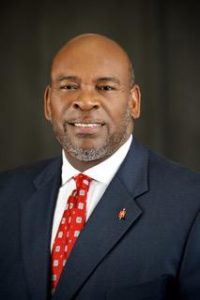
Bishop Jonathan Holston
“As United Methodists and followers of Christ, we commit ourselves to social justice and to opposing racism in all of its forms. We encourage frank and thoughtful conversation and respectful collaboration with a common goal of justice for all. It is our obligation to be a beacon of love when hatred threatens to blot out the light of hope.”
https://www.umcsc.org/bishop-holston-seeks-pentecost-prayers-for-justice-and-peace-amid-racial-tension-unrest/
Bishop Holston wrote in a later statement, “When we witness inexplicable injustice, anger is understandable, protest is appropriate, and action is vital. Violence and destruction, though, is never the answer.
“We are encouraged to see people flood the streets to peacefully call for justice and an end to oppression. This is faith in action – the bedrock of our commitment to social justice as United Methodists and followers of Christ.”
https://www.umcsc.org/bishop-holstons-statement-on-violence-following-peaceful-s-c-protests-of-george-floyd-killing/
* Bishop Frank Beard, Illinois Great Rivers
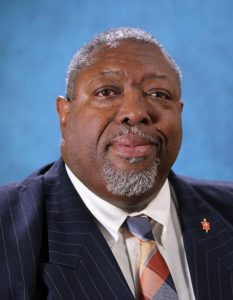
Bishop Frank J. Beard
“It is the job of every Christian to serve as conduits of grace, mercy, and love so that the dark forces of our world might experience the liberating light of Jesus Christ. It is our job to help stamp out hatred in any form. Therefore, I encourage all United Methodist to pray for the families that are affected by this most recent tragedy, as well as those suffering a similar plight in recent months. I remind us all that it is our duty, as sisters and brothers, to stand-up, speak-out, and advocate for those that are hurting and marginalized, so that justice may become a reality.”
https://www.igrc.org/blogpostsdetail/14010915
In a separate statement, Bishop Beard offered practical suggestions as we wrestle with the issues of race, prejudice, and injustice.
“Dealing with racism is not easy and it takes a lot of energy and forethought that will often move us into uncomfortable places. Speaking up and out is important, even though people often are scared to say anything because they worry that if they say the wrong thing, they might get in trouble or find themselves being labeled. It is crucial for Christians to create safe sanctuaries where we can have difficult conversations about racism and other topics that promote injustice.”
Beard offered 10 ways that Christians can begin to “address systemic injustice and discrimination.”
- Becoming aware of policies and practices that promote disparities based on race, ethnicity, stereotypes, or economic status.
- By employing the use of empathetic listening that is engaging and helps with validating the feelings and personal experiences of persons of color, without being dismissive or making explanatory comments that seek to rationalize or soothe away their pain.
- Learn to recognize and understand your own privilege and experiences that are based on skin color and power.
- Share your own story as you engage in tough conversations about race and injustice. Your story will help foster deeper understanding for you and for others as you interact together.
- Recognize that America is NOT a “melting pot” but rather a “garden salad” containing a blend of unique colors and flavors meant to be experienced together. DO Not give in to the myth that you must be “color blind.”
- Seek to identify with those that are marginalized and who face the effects of a system that thrives and survives on racist behavior and practices.
- Use the power of your own personal finances by taking a stand with your money. Be aware of the practices of those you do business with.
- Create safe places for difficult conversations, utilizing people experienced in providing diversity training.
- Develop and foster relationships with people of color based on mutual respect and concern for each other’s well-being.
- As people of faith, pray for and with others, that Jesus’ prayer for unity would become a reality.
https://www.igrc.org/blogpostsdetail/simple-strategic-steps-christians-seeking-to-do-something-significant-14014492

by Steve | Jun 1, 2020 | In the News, Perspective E-Newsletter
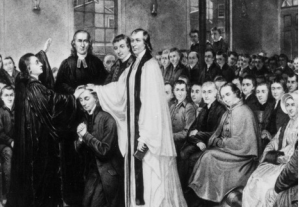
An engraving of an 1882 painting recreating Asbury’s ordination as bishop at the 1784 Christmas Conference.
By Thomas Lambrecht –
“Conferencing” is at the heart of Methodist history and tradition. In 1744, only a few years after starting the Methodist movement, John Wesley called together the small group of preachers who formed the core of the movement for a “conference” meeting. They gathered to discern “how we should proceed to save our own souls and those that heard us.” Their agenda was simple, but comprehensive: “1. What to teach, 2. How to teach, and 3. What to do, that is, how to regulate our doctrine, discipline, and practice.”
Ever since, the “conference” has been part and parcel of how Methodists do church. The 1744 conference became an annual affair, a gathering of all the preachers (lay and clergy) who were “in connexion” with John Wesley. Thus, the “annual conference” became the center of Methodist organization. As the church was formed in America and grew, the number of annual conferences multiplied, covering different geographical parts of the country, and later, of the world. Each annual conference formed a geographical section of the general church. To maintain unity, a General Conference consisted of representatives from all the various annual conferences, making decisions on behalf of the whole church. When the church was broken up into regions in 1939, those bodies were called jurisdictional conferences and later central conferences (i.e., jurisdictions outside the U.S.), for the purpose of electing and assigning bishops. Within each annual conference, there are sub-regions called districts that have a “district conference.” And of course the basic building block of the denomination is the local “church conference” or “charge conference.”
Conferences are far more than geographical organizational units. They represent the intuitive genius of Wesley’s organizational mind that identified collective decision-making as an essential component of church structure. Many Protestant denominations in Wesley’s time were governed by irregularly meeting synods or councils that would gather only when necessary. Wesley saw the strength to be gained by collective decision-making by a body of people that is held in constant relationship and mutual accountability.
The idea of collective decision-making was instituted early in the Church’s history, at the Council of Jerusalem (Acts 15), which was called to decide whether Gentile converts must be circumcised and required to follow the Law of Moses. Such collective decision-making allows the Holy Spirit to speak through the diversity of voices who are part of the collective. Reaching agreement among a broad group of leaders often results in a more faithful decision and one that is able to consider more of the ramifications of that decision. It has the added benefit of gaining “buy-in” from the same group of leaders that will have to implement the decisions that are made.
The Wesleyan Covenant Association (WCA) has just released Part Seven of its draft Book of Doctrines and Discipline, addressing the role of annual, regional, and general conferences in a new global traditional Methodist denomination. Additional provisions about conferences may be found in the proposed Constitution, ¶203, Articles VI-VIII, that was previously released. Sections previously released may be reviewed on our website resource page here.
As the WCA considered the wisdom of retaining our conferencing system of decision-making and organization, we also realized the current United Methodist system had strayed off the path in a number of ways that need to be corrected if Methodism is to recover its vitality.
First, the UM system has reversed the hierarchy in an unhelpful way. The annual conference and General Conference were instituted as means to support and empower the work of the local church, which is (we say) “the most significant arena through which disciple-making occurs.” Instead, in recent years, it seems like the local church has existed to support the work of the annual and General Conference. In its reformation of the conference system, the WCA strives to make crystal clear that conferences exist to support the local church, not the other way around.
Second, and relatedly, the annual and General Conferences have grown too large in structure and demand too many resources. The “needs” of ministry at the regional and global levels siphon off too much time and financial resources from local churches, which then weakens the local ministry rather than strengthens it. This is seen in the amount of time pastors spend on annual conference business outside their parish and bishops spend on global church business outside their annual conferences. Many local churches do not see the value to them of the work that annual conference and general church agencies do “on their behalf.”
Accordingly, the WCA’s proposal calls for a lean annual conference structure demanding lower apportionments and less time investment in bureaucracy and meetings, with more time and financial investment in work that explicitly supports the ministry of local churches, including the aggressive planting of new congregations. Bishops and district superintendents are relieved of many of their administrative responsibilities and expected to focus their time and energy within their districts and annual conferences, while still building connections to the worldwide church based on mutual ministry, rather than meetings (see Part Six of the draft Book of Doctrines and Discipline.)
The general church would have only five agencies (called “commissions”) to handle the coordinating and facilitating work of the denomination. (More details on these commissions are found in Part Eight of the WCA’s draft “Book of Doctrines and Discipline” which will be released soon.) The annual conference would have only four required boards or committees to facilitate its work. (It could form more as needed.) The emphasis is really on reducing the amount of structure and reorienting the work of the annual conference and general church to support the local church’s ministry.
Third, as the church has grown over the last 100 years, its Book of Discipline has gotten too prescriptive and controlling, with all kinds of mandates and requirements that often hamper the work of the local church. The current Discipline is 819 pages (not including the index). I have a 1926 Discipline that is only half that size and includes worship rituals, judicial decisions, a description of the course of study, and a directory!
Accordingly, the WCA proposal allows annual conferences to structure themselves in a way that makes sense for them, aside from the minimal requirements for four agencies. This will allow conferences to stay lean in structure, yet nimble enough to adapt to changing circumstances. It will also allow for cultural differences in various parts of the world to be reflected in variations of structure and process. At the same time, nearly all the provisions in the draft “Book of Doctrines and Discipline” would meet the needs and requirements in conferences around the world. The WCA has worked to craft a book that would apply equally well in Bulgaria, the Philippines, the U.S., or Zimbabwe. This will allow for greater uniformity on the essential matters, while allowing flexibility in many other matters.
Finally, in an effort to take the focus of the church off of the (sometimes contentious) General Conference, the WCA proposal in ¶ 203 (Article VI) of the draft “Book of Doctrines and Discipline,” envisions General Conference meeting only once every six years, instead of quadrennially. For the first six years, it would meet every two years in order to fine tune the general church’s core teachings and governance structure as we live into a new reality. But thereafter, General Conference will be reserved for making the larger policy decisions and letting annual conferences and local churches focus on their ministry.
The WCA’s proposals are just that — proposals. They will be presented as legislation to the convening conference of a new global traditional Methodist church. We hope you will consider them and give constructive feedback as we compile ideas to guide the formation of a new Methodist denomination that focuses both on biblical faithfulness and on ministry effectiveness and fruitfulness.
Thomas Lambrecht is a United Methodist clergyperson and the vice president of Good News.

by Steve | May 22, 2020 | In the News, Perspective E-Newsletter
By Thomas Lambrecht –

The Rev. Nicky Gumbel leads Holy Trinity Brompton church in London, home of The Alpha Course. Photo: Holy Trinity Brompton
In times of crisis, people often turn to God. There is some anecdotal evidence that is happening now with the coronavirus pandemic.
Bible downloads in Google Play and App Store exceeded 2 million in March, the highest total ever for the month. Attendance at the on-line Alpha Course doubled at Holy Trinity Brompton Church in London, one of the largest churches in England. (That course — now taken by an estimated 23 million people around the globe — enables non-Christians to ask questions about faith and Christianity.)
A survey found that 44 percent of respondents believe that the pandemic and the resulting economic meltdown is a wake-up call for us to turn back to God or a sign of coming judgment. The same survey found that over 20 percent of non-Christians reported that they have responded to the crisis by starting to read the Bible, listening to sermons or Bible teachings, or engaging in conversations about spiritual things.
When a crisis hits, many people turn to engage the big, existential questions of life: Why am I here? Who am I really? Is there a God? What will happen to me when I die?
Churches have the unique opportunity to point people to the answers to these kinds of questions and to walk with them during a time of discovery and spiritual growth. God can use crises like this one to influence the spiritual life of a whole generation.
Churches are to be commended for the ways they are reaching out and serving their communities through making and distributing masks, providing food, helping people pay the rent, and serving immigrant communities in the U.S. and the needs of the poor around the world. These practical ways of helping people survive in the midst of the health and economic crises are an essential work of the church. God gives us what we have, so that we can be a blessing to others.
At the same time, Christian teaching compels us to not only provide for the physical needs of people but for their spiritual needs, as well. The church can speak to the existential questions of life like no others can. Through faith in Christ, we have the answers to who we are, why we are here, and what our future entails. God has specially equipped the church to truly feed the soul.
In the midst of the death, illness, and hardship of our times, we can offer an eternal perspective that transcends our earthly travails.
I was reminded of this by Dr. Kevin Watson’s recent summary of Charles Wesley’s sermon, “Awake, Thou That Sleepest.” He points out that one of Wesley’s main points is this earth is not our permanent place. “This is not thy home,” Wesley says. “Think not of building tabernacles here. Thou art but ‘a stranger, a sojourner upon earth’; a creature of a day, but just launching out into an unchangeable state. Make haste; eternity is at hand” (II.5).
Having that eternal perspective changes how we view and how we cope with the ups and downs of everyday life, including this unforeseen pandemic. We realize that we are not just living for the present, but for eternity. The trials and difficulties of life are overshadowed by the promised joys of an eternity lived in fellowship with the Lord. We look forward to the time when “God’s dwelling place is now among the people, and he will dwell with them. They will be his people, and God himself will be with them and be their God. He will wipe every tear from their eyes. There will be no more death or mourning or crying or pain” (Revelation 21:3-4).

Ravi Zacharias (Ben May/Ravi Zacharias International Ministries)
We learned this week of the passing into eternal life of Ravi Zacharias, a prominent evangelist and expert in apologetics from India. His 48-year global ministry touched countless lives, and his 27 books continue to share his message about his Savior, Jesus Christ.
Ravi’s eternal perspective is summed up in a hymn written by the New England Puritan, Richard Baxter (1615-1691), that Ravi quoted just weeks before his unexpected death:
Lord, it belongs not to my care
Whether I die or live;
To love and serve Thee is my share,
And this Thy grace must give.
If life be long, I will be glad
That I may long obey;
If short, yet why should I be sad
To welcome endless day?
Christ leads me through no darker rooms
Than He went through before;
He that unto God’s kingdom comes
Must enter by this door.
Come Lord, when grace hath made me meet
Thy blessed face to see;
For if Thy work on earth be sweet
What will thy glory be!
Then I shall end my sad complaints
And weary sinful days,
And join with the triumphant saints
That sing my Savior’s praise.
My knowledge of that life is small,
The eye of faith is dim;
But ’tis enough that Christ knows all,
And I shall be with Him.
As we labor hard to serve the needs of others during this pandemic and recession, we are simultaneously reminded to turn our eyes and the eyes of those we serve to heaven, to eternity, and to the Lord. The church is uniquely positioned to lift up the One who said, “I am the resurrection and the life. The one who believes in me will live, even though they die; and the one who lives by believing in me will never die” (John 11:25-26).
Jesus asked Martha, “Do you believe this?”
Do we? Do we live it?
Living with an eye on eternity changes everything. We can winsomely share Christ with others who are seeking him now without knowing what or whom they seek. His presence will give meaning to their lives as it does to ours, and it gives us the strength and the courage to face the challenges of each new day. By faith we can say, “It is enough that Christ knows all, and I shall be with Him.”
Thomas Lambrecht is a United Methodist clergyperson and the vice president of Good News.

by Steve | May 14, 2020 | In the News, Perspective E-Newsletter
 By Tom Lambrecht –
By Tom Lambrecht –
I am a planner. I like to have at least a rough plan in mind for any undertaking that I am part of, whether it is a work project or a trip to the beach. I get that from my Dad, who was a high school band director and needed to plan everything from rehearsal schedules to band trips.
Of course, the coronavirus pandemic has thrown the plans of literally billions of people into the trash. Everything that people planned to do, from work to retirement, weddings to General Conference, has been put on hold or dramatically altered or canceled. Scottish poet Robert Burns wrote, “The best laid schemes o’ mice an’ men / Gang aft a-gley [go oft awry]” (To a Mouse, 1785). It was one of my Dad’s favorite sayings when his plans got disrupted. A more succinct way of putting it is, “People plan, God laughs.”
We think we have life under control, and then something happens to disrupt our plans. It could be something negative like the pandemic, illness, job loss, a death in the family. It could even be something positive, like a new job requiring a move or a new baby in the family. As a pastor, I was familiar with unplanned moves. A single call from the district superintendent can upend one’s life! Every time it happens, it reminds us that we are not in control.
The Israelites needed to learn that lesson early in their formation as a nation. When the two or three million Israelites escaped from Egypt, they had to learn to depend upon God for everything. He guided them through the wilderness on the way to the Promised Land, and on the way supplied them with food and water every single day in miraculous ways.
The most dramatic lesson in dependence upon God is found in Numbers 9:15-23. God’s presence hovered over the Tent of Meeting (Tabernacle). “Whenever the cloud lifted from above the Tent, the Israelites set out; wherever the cloud settled, the Israelites encamped. At the Lord’s command the Israelites set out, and at his command they encamped.” “Whether the cloud stayed over the tabernacle for two days or a month or a year, the Israelites would remain in camp and not set out; but when it lifted, they would set out.”
The Israelites had only a rough idea where they were headed and how to get there. They did not know from one day to the next whether they would stay in camp or set out on the next stage of the journey. They had to depend completely on the Lord to determine their travel schedule. They were unable to plan and had to live day to day.
That is somewhat where we find ourselves today. Conditions change, restrictions are adjusted, new closings or openings are announced. At any point, we or a family member could come down with the virus and be ill. We are living day to day in dependence upon the Lord in a more vivid way now than we experience in “normal” life.
The Israelites learned during their time of absolute dependence upon God that he would never abandon them or let them down. Moses reminded them what they had experienced during their wandering, “Your clothes did not wear out and your feet did not swell during these forty years” (Deuteronomy 8:4, 29:5). God took care of their every need, as they walked in dependence upon him from day to day.
That is God’s promise to us. “So do not worry, saying, ‘What shall we eat?’ or ‘What shall we drink?’ or ‘What shall we wear?’ For the pagans run after all these things, and your heavenly Father knows that you need them. But seek first his kingdom and his righteousness, and all these things will be given to you as well. Therefore, do not worry about tomorrow, for tomorrow will worry about itself. Each day has enough trouble of its own” (Matthew 6:31-34).
Of course, one of the opportunities we are given in this pandemic is sharing with those in need, if we have more than enough. We can be the answer to someone’s prayer, the fulfillment of God’s promise of loving care for a person or family we know, or even for people we do not know and who may live halfway around the world. We can follow that nudge of the Holy Spirit to share what we have.
Our dependence on the Lord does not mean that we give up planning for the future. After all, Jesus reminds us, “Suppose one of you wants to build a tower. Will he not first sit down and estimate the cost to see if he has enough money to complete it?” (Luke 14:28). It only means that we should hold our plans lightly. All our plans are “subject to change” as the Lord works in our lives, and the circumstances of this world impinge on what we can do.
James put it well. “Pay attention, you who say, ‘Today or tomorrow we will go to such-and-such a town. We will stay there a year, buying and selling, and make a profit.’ You don’t really know about tomorrow! What is your life? You are a mist that appears for only a short while before it vanishes. Here’s what you ought to say: ‘If the Lord wills, we will live and do this or that'” (James 4:13-15).
I often find it is hard to let go of plans that I have made. After all, I had it figured out so perfectly! But the Lord has to remind me to hold my life with an open hand. “If the Lord wills.” What better way to express our daily dependence upon him? He is God, and I am not. And that realization gives me peace and security in the midst of the unpredictable circumstances of life.
Thomas Lambrecht is a United Methodist clergyperson and the vice president of Good News.

by Steve | May 8, 2020 | In the News, Perspective E-Newsletter
 By Tom Lambrecht –
By Tom Lambrecht –
The coronavirus pandemic has caused a lot of disruption in our lives, in how our country functions, and in how our churches function, as well. Nowhere was that in greater evidence than in a May 5th “Town Hall” meeting held online by Mainstream UMC, a “centrist” advocacy group within The United Methodist Church. Various presenters appeared from their homes in different parts of the U.S., facilitated by two college students also at home because their college was closed due to the pandemic. This has become the “new normal” for our church, at least in the short-term future. And we may make more use of this kind of “meeting” in the future, now that many of us are at least somewhat more comfortable with the technology.
The event coincided with the originally scheduled opening of the 2020 General Conference, which of course has been postponed until later next year. Those unable to watch the livestream of the Town Hall can watch a recorded version that was promised to eventually have markers to identify the various questions that were discussed.
This Mainstream UMC Town Hall was called to consider how centrists and progressives can pursue their goal of a church that affirms LGBTQ ordination and marriage, in light of the postponement of General Conference. Subtitled “A Call for Grace,” the group proposed ways that they and the whole church could anticipate the reality of separation in the future through actions taken over the next 16 months.
There are several important takeaways from the presentation made during the meeting. Most notable in the “Call for Grace” were two proposals made by Mainstream executive director, the Rev. Mark Holland from Olathe, Kansas.
Continue the Moratorium
First, Holland proposed that the moratorium on complaints and judicial proceedings related to same-sex weddings and clergy being “self-avowed practicing homosexuals” should continue during this delay until the General Conference in 2021. The moratorium would mean that all proceedings or processing of complaints over these issues would be suspended and not carried forward to a trial. That, of course, is in line with what the Protocol for Reconciliation and Grace through Separation calls for. What the Protocol originally envisioned as a four-month moratorium has now turned into perhaps a 20-month moratorium. Just as the terms of bishops and Judicial Council members have been extended in the wake of the General Conference postponement, it makes sense to carry forward the moratorium informally until General Conference can pass it as part of the “package deal” guaranteeing separation.
Of course, the moratorium is only a request at this point, since it depends upon General Conference action to make it binding and official. Many bishops are abiding by the moratorium, but some are not willing to do so. It still depends upon the willingness of the bishop, and the Mainstream UMC advocacy group has instituted a petition drive to convince bishops to go along. The moratorium would really be unnecessary if there were also a moratorium on performing same-sex weddings or ordaining non-celibate LGBTQ persons. The best sign of grace would be for everyone to stand down and not engender further conflict from either “side” by their actions.
Encouragingly, although not part of his formal proposal, Holland also endorsed the Protocol’s agreed moratorium on the closure of churches except for financial non-viability. We continue to hear reports that a few annual conferences are precipitously closing churches that seem to be functioning fine in order to claim the local church’s property and assets. Traditionalists will join Holland in urging that unnecessary church closures should be put on hold until after General Conference.
Allow Local Churches to Separate Now
The second part of Holland’s “Call for Grace” was to suggest that local churches desiring to separate from The United Methodist Church in order to join or form a new traditional Methodist denomination be allowed to depart with their property under the terms of the Protocol, even though General Conference has not yet enacted those terms. The Protocol’s terms are much less onerous and expensive than the current process in the Discipline. Bishops and annual conferences have the discretionary authority to at least partially follow this proposal, but it again depends upon the willingness of the bishop.
While traditionalists will appreciate the gesture and the attempt at even-handedness, this proposal is fraught with difficulty. In annual conferences that are majority traditional in understanding, it would weaken the traditional voice if local churches started departing from the denomination in advance of an annual conference vote. That could jeopardize the ability of the whole annual conference to separate and join the new denomination. The ability to leave under these more generous terms would be welcome in annual conferences where traditional churches find themselves in a small minority. However, these may be the annual conferences least likely to allow for such generous departure terms, absent a General Conference action.
The major provision in the more generous terms for separation by local churches is the ability to transfer their share of unfunded pension liabilities to a new denomination. But no such denomination exists right now for those liabilities to be transferred to, nor can it exist until the General Conference acts. Most traditional churches will be unable to take advantage of this proposal and would prefer to wait until General Conference enacts uniform terms for separation that cover everyone. A piecemeal separation by some traditional churches may not be helpful to the traditional cause. An orderly process of separation that leads to a strong new traditional denomination is the best way forward.
The Protocol Still on Track
Probably the most important takeaway from this Town Hall is the assessment that centrist and progressive leaders still strongly support the Protocol. Centrists such as Holland continue to promote the Protocol (as do traditional organizations like Good News, the Confessing Movement, and the Wesleyan Covenant Association). That means that, despite the delay, the Protocol is still on track to pass General Conference. There is almost universal acknowledgement among General Conference delegates that some form of separation is necessary to resolve our church’s conflict, and the Protocol seems to have the most support of any plan that has been put forward. While there are still 16 months to go, and nothing is certain until General Conference acts, the chances continue to be good that the Protocol will pass.
It is noteworthy that Holland continues to defend the $25 million settlement to be allocated to a new traditional Methodist denomination. He noted that The Episcopal Church and other mainline denominations that separated recently over these same issues have spent tens of millions of dollars in lawsuits. Holland opined (and traditionalists would agree) that money would be better spent seeding new denominations than carrying on legal disputes over property. Crucially, all the terms of the Protocol agreement are interdependent. To substantially change one term would upset the balance of the agreement and throw the whole package into doubt. Thankfully, there are no prominent centrist or progressive leaders calling for changes in the terms of the Protocol.
Many Centrists Are Really Progressives
It became apparent throughout the Town Hall that the agenda for a post-separation United Methodist Church would be unwaveringly progressive. Although the tone of the meeting was reasonable or even irenic at times, there was a strong commitment to ending “discrimination” against LGBTQ persons and relationships. Many centrists appear to think that, while other parts of the global church could continue to have their own rules against same-sex marriage and the ordination of practicing homosexuals, the U.S. church would be largely of one mind and one practice in affirming both.
To this end, Holland promoted the “Christmas Covenant” proposal that would create regional conferences within the global church, allowing each national church to have its own teachings about marriage and human sexuality. One questioner highlighted the apparent hypocrisy in this approach by asking whether a regional conference approach would have been acceptable in extending ordination to women or overcoming racial segregation.
Judging from the Town Hall presentation, it appears that the majority of centrists and progressives would not be comfortable allowing traditional views to prevail in any part of the church for long. Traditionalists who stay in the post-separation United Methodist Church might find their views tolerated on paper, but extremely marginalized in practice.
Thomas Lambrecht is a United Methodist clergyperson and the vice president of Good News.

by Steve | May 4, 2020 | In the News, Perspective E-Newsletter

We are so thankful for the amazing care-givers and first-responders who have stepped into the spotlight during this COVID-19 pandemic. Angela Gleaves, a nurse at Vanderbilt University Medical Center in Nashville, Tennessee, posted this uplifting photo on Facebook amid the coronavirus pandemic of her and four of her fellow nurses praying from the hospital’s helipad atop the building: “When you have a few extra minutes at work you take the time to go to the Helipad and pray. We prayed over the staff in our unit as well as all of the hospital employees. We also prayed over the patients and their families during this trying time. We also prayed for all of our colleagues around the world taking care of patients. It felt good to do this with some of my amazing co-workers. We could feel God’s presence in the wind. Know that you are all covered in prayer.”
During these dark and difficult times, please pray for all those who are caring for the sick and dying.
As Paul reminds us, “Do not be anxious about anything, but in every situation, by prayer and petition, with thanksgiving, present your requests to God” (Philippians 4:6).











 By Tom Lambrecht –
By Tom Lambrecht –